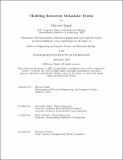| dc.contributor.advisor | Gusev, Alexander | |
| dc.contributor.advisor | Szolovits, Peter | |
| dc.contributor.author | Singh, Harveer | |
| dc.date.accessioned | 2023-11-02T20:24:01Z | |
| dc.date.available | 2023-11-02T20:24:01Z | |
| dc.date.issued | 2023-09 | |
| dc.date.submitted | 2023-10-03T18:21:07.564Z | |
| dc.identifier.uri | https://hdl.handle.net/1721.1/152875 | |
| dc.description.abstract | Progression of cancer is marked by metastatic spread, with certain tumors preferentially spreading to specific organ sites – known as organotropism. The site of metastatic spread can significantly impact the mortality of cancer patients, for example with metastases to the brain being highly lethal, but the underlying mechanisms are poorly understood. Here, we aim to characterize the genetic landscape of metastatic drivers to specific organ sites using large-scale tumor sequencing and medical record data. We propose and evaluate a recurrent event survival model that draws additional statistical power from patients with multiple metastases, while modeling loss to follow up and mortality. We analyze tumor sequencing data from over 15,000 unique patients across 8 primary cancers and 7 target organ sites to identify genetic drivers of organotropism among a panel of 547 genes. We identify 1,130 somatic alterations significantly associated with organotropism, including 171 associations with brain metastases. We train a penalized predictive model that can accurately identify individuals at high risk for metastases to specific organ sites in held out samples. For example, the predicted top 10% of non-small cell lung cancer patients exhibit a hazard ratio of 1.96 for brain metastases relative to the bottom 10%. Our results demonstrate the power of recurrent event modeling in a real world clinical cohort to characterize the genetic landscape of organotropic events. | |
| dc.publisher | Massachusetts Institute of Technology | |
| dc.rights | In Copyright - Educational Use Permitted | |
| dc.rights | Copyright retained by author(s) | |
| dc.rights.uri | https://rightsstatements.org/page/InC-EDU/1.0/ | |
| dc.title | Modeling Recurrent Metastatic Events | |
| dc.type | Thesis | |
| dc.description.degree | M.Eng. | |
| dc.contributor.department | Massachusetts Institute of Technology. Department of Electrical Engineering and Computer Science | |
| mit.thesis.degree | Master | |
| thesis.degree.name | Master of Engineering in Computer Science and Molecular Biology | |
